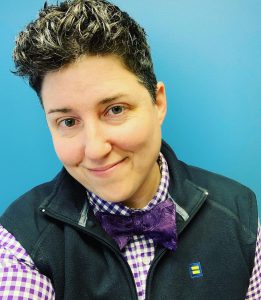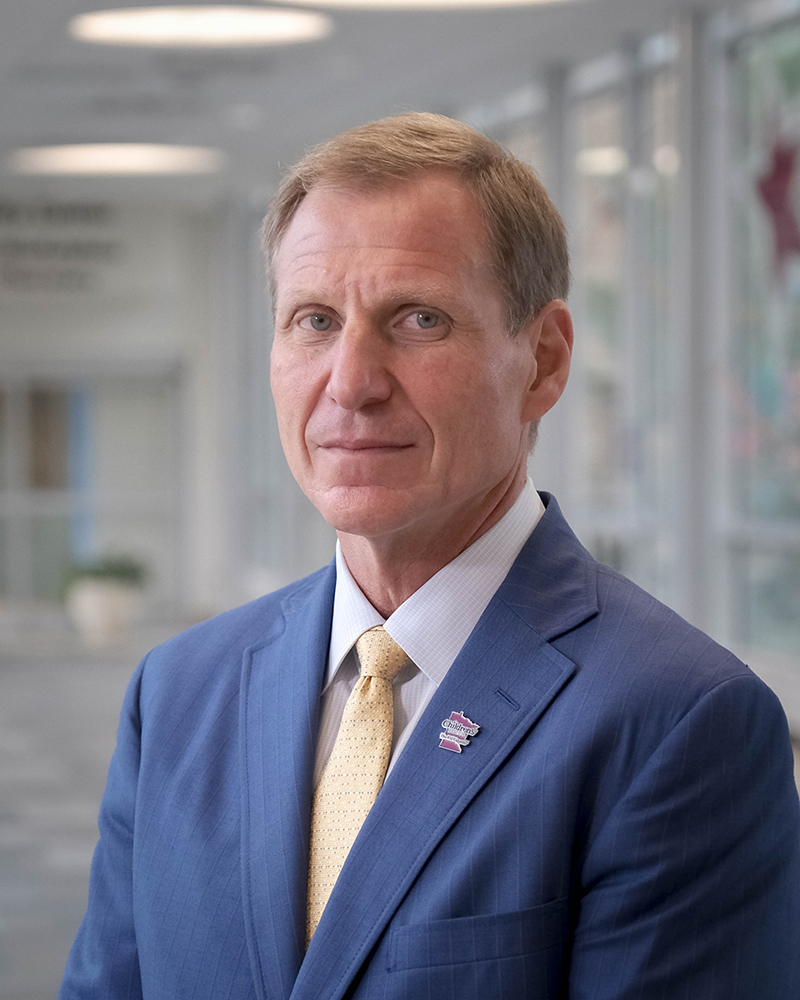As CEO of Children’s Minnesota, I am committed to advancing our vision of being every family’s essential partner in raising healthier children. The recent death of 16-year-old Nex Benedict shows that sadly, too many kids are still not being given the opportunity to thrive.

Be the one: A call to action from Dr. Kade Goepferd
What more can we adults, the people kids look up to, do to keep our kids safe? I’ve invited Dr. Kade Goepferd, medical director of the Children’s Minnesota Gender Health program, to share where we are falling short and how we can do better.
Dr. Kade Goepferd’s words:
When I speak about my work providing essential health care to transgender and gender diverse youth, I often get asked how and why I became involved in this area of pediatric health care.
And at the core, the answer comes down to one simple truth: I became a pediatrician for one reason, to help kids thrive. That’s what every single child deserves. Unfortunately, far too many transgender and gender diverse kids, across the country and here in Minnesota, aren’t getting the support they need to live their best lives as their authentic selves.

Kids must feel safe to thrive
Nex Benedict, who identified as non-binary, was bullied in school repeatedly. A few days prior to their death, when they were being interviewed by a police officer about getting “jumped” in the bathroom at school, Nex said they didn’t report the bullying to an adult at school because they didn’t think it would do any good. I wish I could say this incident was isolated to Nex’s experience, but the truth is that according to GLSEN’s National School Climate Survey, 52% of LGBTQ youth report a hostile school environment severe enough that they are considering dropping out. And even more shocking? This same survey reinforces Nex’s hopeless comments to law enforcement; youth report that only 10% of the time do school staff or teachers intervene in cases of LGBTQ harassment in school.
We know it’s hard for kids to thrive when they don’t feel safe. Our Minnesota lawmakers recognized this too, and in 2014, they passed the Safe and Supportive Schools Act, a law designed to help kids feel safe at school by protecting them from bullying. They included language that specifically protects students based on sexual identity/orientation and gender identity/expression. I wish I could say the law has been an unqualified success. But my colleagues at the Children’s Minnesota Gender Health program and I hear story after story from kids who, despite legal protection, are still bullied in schools across Minnesota and experience harassment and discrimination from both their peers AND school staff/teachers.
The evidence isn’t just anecdotal. The 2021 GLSEN National School Climate Survey’s State Snapshot for Minnesota shows that most LGBTQ+ students in Minnesota experience anti-LGBTQ victimization at school based on their sexual orientation, gender expression or gender identity. Examples of harassment include online, verbal and physical harassment and physical assault. This same survey shows that many LGBTQ+ students in Minnesota report discriminatory policies or practices at their school, with 53% experiencing at least one form of anti-LGBTQ+ discrimination. For transgender and gender diverse students, examples of discrimination include being denied access to a bathroom or locker room aligned with their identity, not being allowed to play on the sports team consistent with their identity and refusal to use their chosen name or pronouns at school.
Kids like Nex live in every state
The bottom line is there are kids like Nex in every state; kids who are bullied, but don’t feel like adults will take their concerns seriously and don’t feel like adults will help them. Even in states with legal protection for kids. Even in Minnesota.
While laws are a good place to start, we can’t end there. Transgender and gender diverse youth need and deserve a community of supportive adults who will do what’s right to keep them safe. Who will speak out at PTA and school board meetings. Who will teach their own kids how to interrupt bullying and be an effective ally in schools. Who will invest in the health care infrastructure to make sure that LGBTQ+ kids, especially transgender and gender diverse kids, have the health care and mental health support they need to thrive. It’s up to us to set an example that shows all kids that they deserve to be treated with dignity and respect.
When young people feel they have nowhere to turn and that their lives don’t hold value, it’s easy to see how they develop a sense of hopelessness that can lead to self-harm, suicidal thoughts and suicide attempts. Suicide happens when kids feel dehumanized and hopeless. LGBTQ+ young people are more than four times as likely to attempt suicide than their peers. The Trevor Project estimates that more than 1.8 million LGBTQ+ young people (ages 13-24) seriously consider suicide each year in the U.S. — and at least one attempts suicide every 45 seconds. This means that 41% of LGBTQ+ young people seriously considered attempting suicide in the past year, including roughly half of transgender and nonbinary youth.
The good news
That’s the bad news. The good news is that we can make a difference. Kids need to know they will be safe and supported. They need to know they have a future as happy, healthy and successful LGBTQ+ adults. They need to know that if they speak up about being bullied that it WILL do some good and that the adults in their lives will protect them. It just takes one supportive adult in a LGBTQ+ young person’s life to reduce their risk of attempting suicide by 40%. It starts with us. Be the one.
